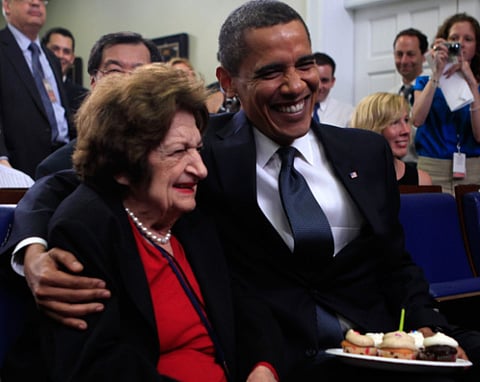Helen Thomas: A pioneer in her own right
Journalist Helen Thomas was an irrepressible White House correspondent who grilled 10 presidents

Washington; Helen Thomas, the irrepressible White House correspondent who used her seat in the front row of history to grill 10 presidents — often to their discomfort and was not shy about sharing her opinions, died yesterday. She was 92.
Thomas made her name as a bulldog for United Press International in the great wire-service rivalries of old, and as a pioneer for women in journalism.
She was persistent to the point of badgering. One White House press secretary described her questioning as “torture” — and he was one of her fans.
Her refusal to conceal her strong opinions, even when posing questions to a president, and her public hostility towards Israel, caused discomfort among colleagues.
In 2010, that tendency finally ended a career that had started in 1943 and made her one of the best-known journalists in Washington.
On a videotape circulated on the internet, she said Israelis should “get out of Palestine” and “go home” to Germany, Poland or the US. The remark brought widespread condemnation and she ended her career.
In January 2011, she became a columnist for a free weekly paper in a Washington suburb, months after the controversy forced her from her previous post.
In her long career, she was indelibly associated with the ritual ending White House news conferences. She was often the one to deliver the closing line: “Thank you, Mister President” — four polite words that belied a fiercely competitive streak.
Her disdain for White House secrecy and dodging spanned five decades, back to President John Kennedy. Her freedom to voice her peppery opinions as a speaker and a Hearst columnist came late in her career.
The Bush administration marginalised her, clearly peeved with a journalist who had challenged President George W. Bush to his face on the Iraq war and declared him the worst president in history.
After she quit UPI in 2000 — by then an outsized figure in a shrunken organisation — her influence waned.
Thomas was accustomed to getting under the skin of presidents, if not to the cold shoulder. “If you want to be loved,” she said years earlier, “go into something else.”
There was a lighter mood in August 2009, on her 89th birthday, when President Barack Obama popped into the White House briefing room unannounced. He led the roomful of reporters in singing ‘Happy Birthday to You’ and gave her cupcakes. As it happened, it was the president’s birthday too, his 48th.
Thomas was at the forefront of women’s achievements in journalism. She was one of the first female reporters to break out of the White House ‘women’s beat’ — the soft stories about presidents’ kids, wives, their teas and their hairdos — and cover the hard news on an equal footing with men.
Several firsts
She became the first female White House bureau chief for a wire service when UPI gave her the position in 1974. She was also the first female officer at the National Press Club, where women had once been barred as members and she had to fight for admission into the 1959 luncheon speech where Soviet Premier Nikita Khrushchev warned: “We will bury you.”
The belligerent Khrushchev was an unlikely ally in one sense. He had refused to speak at any Washington venue that excluded women, she said.
Thomas fought, too, for a more open presidency, resisting all moves by a succession of administrations to restrict press access.
“People will never know how hard it is to get information,” Thomas told an interviewer, “especially if it’s locked up behind official doors where, if politicians had their way, they’d stamp ‘top secret’ on the colour of the walls.”
Born in Winchester, Kentucky to Lebanese immigrants, Thomas was the seventh of nine children. It was in high school, after working on the student newspaper, that she decided she wanted to become a reporter.
After graduating from Detroit’s Wayne University (now Wayne State University), Thomas headed straight for the nation’s capital. She landed a $17.50-a-week position as a copy girl, with duties that included fetching coffee and doughnuts for editors at the Washington Daily News.
United Press — later United Press International — soon hired her to write local news stories for the radio wire. Her assignments were relegated at first to women’s news, society items and celebrity profiles.
Her big break came after the 1960 election that sent Kennedy to the White House, and landed Thomas her first assignment related to the presidency. She was sent to Palm Beach, Florida, to cover the vacation of the president-elect and his family.
A self-described liberal, Thomas made no secret of her ill feelings for the final president she covered — the second President Bush. “He is the worst president in all of American history,” she told the Daily Breeze of Torrance, California.
Thomas also was critical of the US-led invasion of Iraq, asserting that the deaths of innocent people should hang heavily on Bush’s conscience.
— AP
Sign up for the Daily Briefing
Get the latest news and updates straight to your inbox



